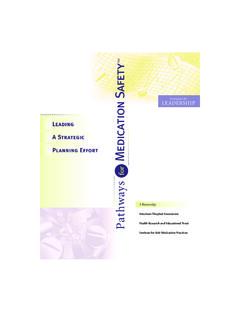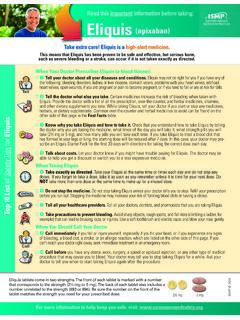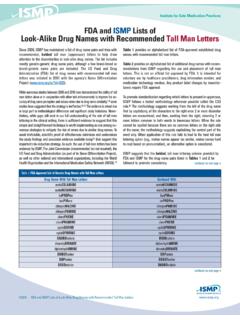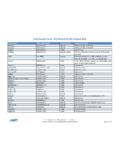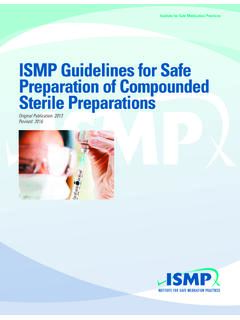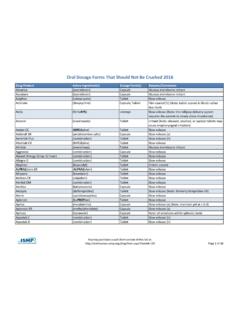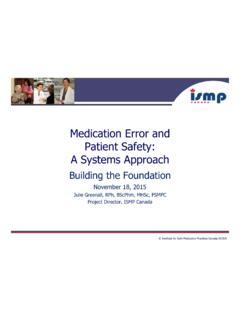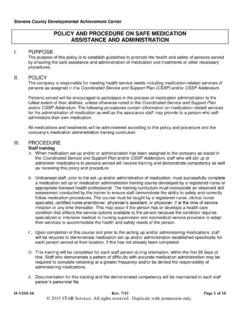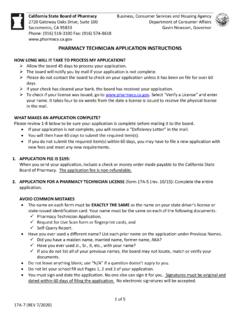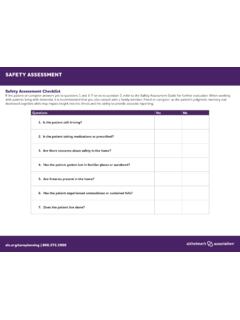Transcription of General High-Alert Medications Neuromuscular Blocking ...
1 ISMP medication safety self Assessment for High-Alert MedicationsGeneral High-Alert MedicationsNeuromuscular Blocking AgentsConcentrated Electrolytes InjectionMagnesium Sulfate Injection Moderate Sedation in Adults and Children,Minimal Sedation in ChildrenInsulin, Subcutaneous and IntravenousLipid-Based Medications and ConventionalCounterpartsMethotrexate for Non-Oncologic UseChemotherapy, Oral and ParenteralAnticoagulantsNeuraxial Opioids and/or Local AnestheticsOpioidsContentsEndorsing Organizations ..3 Invitation to Participate ..4 Acknowledgements ..5 Purpose and Targeted High-Alert Medications ..6 Key Definitions and for Conducting the self for Entering and Submitting Information to Demographics (19 questions for hospitals/long-term care, 13 questions for outpatient facilities)..17 General High-Alert Medications (33 self -assessment items).
2 26 Neuromuscular Blocking Agents(1 demographic question, 15 self -assessment items) ..31 Concentrated Electrolytes Injection (26 self -assessment items)..34 Magnesium Sulfate Injection (2 demographic questions, 22 self -assessment items)..38 Moderate Sedation in Adults and Children, Minimal Sedation in Children(40 self -assessment items)..42 Insulin, Subcutaneous and Intravenous(5 demographic questions, 45 self -assessment items)..48 Lipid-Based Medications and Conventional Counterparts(9 self -assessment items)..58 Methotrexate for Non-Oncologic Use(7 self -assessment items) ..60 Chemotherapy, Oral and Parenteral(5 demographic questions, 48 self -assessment items) ..61 Anticoagulants (1 demographic question, 43 self -assessment items)..68 Neuraxial Opioids and/or Local Anesthetics (32 self -assessment items)..74 Opioids(60 self -assessment items).
3 79 Glossary ..89 About the Institute for Safe medication Practices (ISMP)..94 Logos of Endorsing medication safety self Assessment for High-Alert Medications 2017 Institute for Safe medication Practices (ISMP)Organizations That Have Endorsed the ISMP medication safety self Assessment for High-Alert MedicationsAmerican Association of Colleges of Nursing American Hospital Association American Nurses Association American Society for Healthcare Risk Management American Society for Parenteral and Enteral Nutrition American Society of Health-System Pharmacists Anesthesia Patient safety Foundation Association for the Advancement of Medical Instrumentation Foundation Association of periOperative Registered Nurses ECRI Institute Health Care Improvement Foundation Infusion Nurses Society Institute for Healthcare Improvement National Committee for Quality Assurance National Patient safety Foundation Pediatric Pharmacy Advocacy Group Society of Critical Care Medicine The Joint Commission USP 3 ISMP medication safety self
4 Assessment for High-Alert MedicationsInvitation to Participate Dear Healthcare Provider:The Institute for Safe medication Practices (ISMP) is pleased to provide our nation s healthcare providers with the ISMP medication SafetySelf Assessment for High-Alert Medications . This tool, funded by the US Food and Drug Administration (FDA), offers hospitals, long-termcare facilities, and certain outpatient facilities, such as ambulatory surgery centers, emergency/urgent care facilities, oncology clinics, treat-ment centers, dental surgery centers, endoscopy centers, and diagnostic testing centers, a unique opportunity to assess the safety of systemsand practices associated with up to 11 categories of High-Alert Medications . ISMP defines High-Alert Medications as those bearing a height-ened risk of causing significant patient harm when used in error.
5 The assessment items were assembled by ISMP working with an expert Advisory Group to ensure that the systems and practices most criticalto patient safety were included and achievable in many healthcare facilities. As with our past ISMP medication safety self Assessment tools, many key organizations have endorsed or supported the ISMP medication safety self Assessment for High-Alert Medicationsand offered their ongoing support of this important endeavor. Our endorsers names appear on the previous page, and their logos appear on theback cover and on our facilities that complete the assessment for any or all of the targeted High-Alert Medications will be able to identify specific chal-lenges and opportunities for improvement as well as track their experiences over time. Use of the self assessment will also help providers meetor gauge their compliance with managing High-Alert Medications as required by various state and federal regulatory agencies, such as The JointCommission and the Centers for Medicare & Medicaid Services.
6 Healthcare facilities that submit their assessment findings to ISMP anony-mously via a secure internet portal by February 28, 2018, will also be able to obtain weighted scores for each item based on their effective-ness in reducing the risk of errors, as well as access aggregate data to compare their individual experiences to the aggregate experiences ofdemographically similar healthcare providers. In addition to the usual high standard of confidentiality associated with any information submitted to ISMP, we are also a federally certifiedpatient safety organization (PSO). If self -assessment information is collected within the health system s patient safety evaluation system andsubmitted to ISMP as patient safety work product, the information is granted protection from discovery in connection with a federal, state, orlocal civil, administrative, or disciplinary proceeding.
7 No contract with ISMP is required for this legal protection. As with the data submitted by thousands of healthcare providers in response to our prior ISMP medication safety self Assessment tools,we will use the aggregate findings to develop tools and plan curricula and other means of support to assist you in enhancing safety when usinghigh-alert Medications . Additionally, an analysis of the aggregate results will be submitted for publication in a professional journal to detail ournation s baseline efforts to prevent patient harm from errors associated with High-Alert , FDA, and the endorsing organizations encourage you to participate in this very important endeavor by completing the self assessment asdirected in the instructions and by submitting your findings anonymously to ISMP. We welcome the opportunity to work with you as you assessthe safe use of High-Alert Medications in your organization!
8 Warm regards, Michael R. Cohen, RPh, MS, ScD (hon), DPS (hon), FASHP4 ISMP medication safety self Assessment for High-Alert MedicationsJoshua Atkins, MD, PhDAssociate Professor of Anesthesiology andCritical CareHospital of the University of Pennsylvania Philadelphia, PASteven Belknap, MDHospital Medicine/HospitalistNorthwestern University Feinberg School of Medicine Chicago, IL Michelle Bell, BSN, RN, FISMP, CPPSP atient safety LiaisonPennsylvania Patient safety AuthorityHarrisburg, PABona Benjamin, BS PharmDirector, medication Use QualityImprovementAmerican Society of Health-SystemPharmacistsBethesda, MDKelly Besco, PharmD, FISMP, CPPSM edication safety OfficerOhioHealthColumbus, OHMary Burkhardt, MS, RPh, FASHP,FSMSOC onsultantAnn Arbor, MIFrank Federico, BS PharmVice PresidentInstitute for Healthcare ImprovementCambridge, MAE.
9 Robert Feroli, Jr, PharmD, FASHPM edication safety OfficerJohns Hopkins Hospital Baltimore, MDRyan Forrey, PharmDDirector of PharmacyEmory University HospitalAtlanta, GAJudy Henderson, MSAH-M, RNClinical DirectorAscension HealthSt. Louis, MOJames Hoffman, PharmDChief Patient safety OfficerSt. Jude Children s Research Hospital Memphis, TNPatricia Kienle, BS Pharm, MPA, FASHPD irector, Accreditation and MedicationSafetyCardinalHealthDublin, OHTimothy Lesar, PharmDDirector, Clinical Pharmacy ServicesAlbany Medical Center Albany, NYWayne Marquardt, BS, RPhSenior Pharmacist, Unit Based ClinicalPharmacist Women s HealthHospital of the University of PennsylvaniaPhiladelphia, PASteven Meisel, PharmD, CPPSD irector of Patient SafetyFairview Health Services Minneapolis, MNBarbara Olson, RN, MSNS enior Patient safety OfficerLifePoint HealthBrentwood, TNSean O Neill, PharmDMedication safety OfficerThe Children s Hospital of PhiladelphiaPhiladelphia, PADaniel Sheridan, RPh, MSMedication safety PharmacistOhioHealth Marion General Hospital Marion, OHKaren Smethers, BS, PharmD.
10 BCOPN ational Clinical Pharmacy IntegrationLeaderAscension HealthSt. Louis, MOLorraine Williams, PharmDPatient and medication safety OfficerCook Children s Health Care SystemFort Worth, TX5 ISMP medication safety self Assessment for High-Alert MedicationsAcknowledgementsFunding and SponsorshipISMP thanks the US Food and Drug Administration (FDA) for funding and sponsorship of this research effort under contract# HHSF223201510136C. All materials associated with this research effort represent the position of ISMP and not necessarily that of FDA. Advisory GroupISMP thanks the following members of our voluntary Advisory Group, who helped inform the content of the ISMP medication safety SelfAssessment for High-Alert ISMP medication safety self Assessment for High-Alert Medications is designed to.


